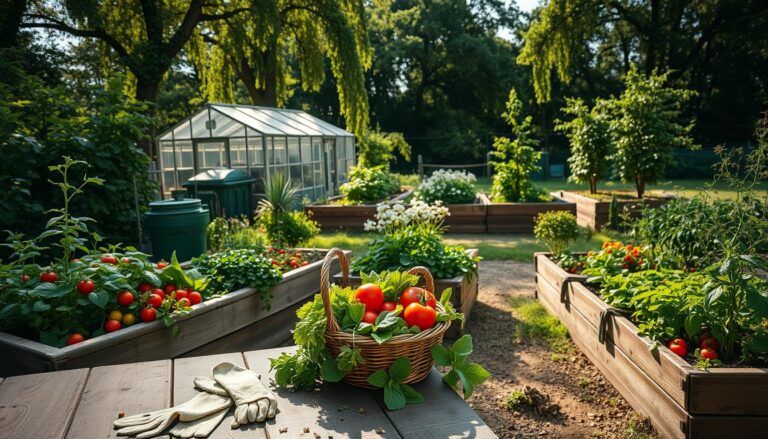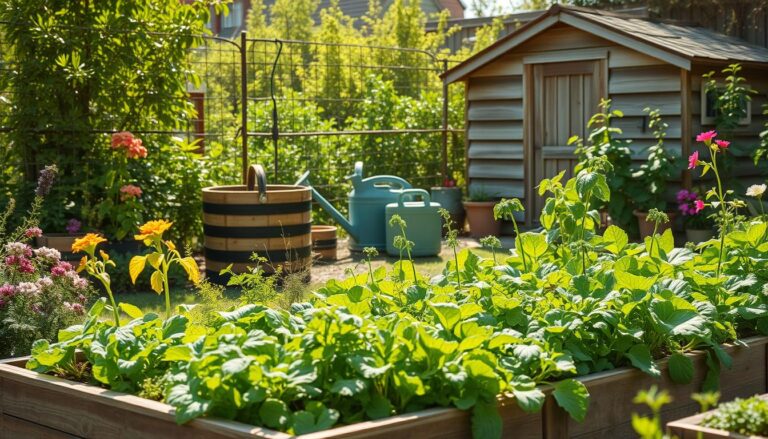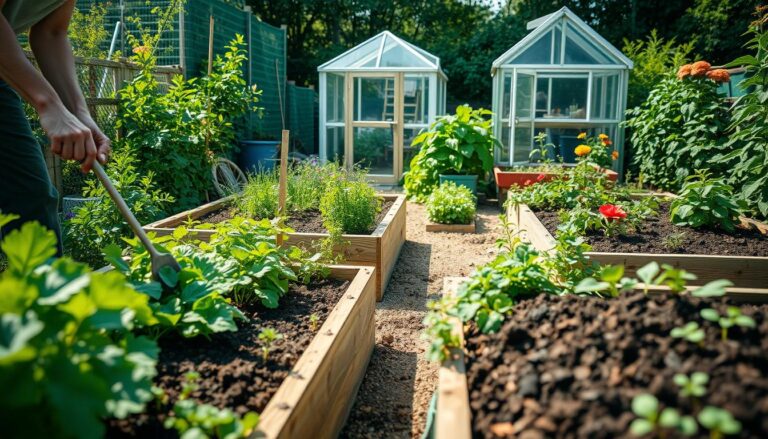Growing your own organic garden is rewarding. It gives you fresh produce and helps the environment.
Using organic gardening practices has many benefits. It boosts your health and mental well-being. It also helps make the future more sustainable.
This article will look at the organic gardening benefits. We’ll see how it improves your health, supports local ecosystems, and builds community.
What is Organic Gardening?
Organic gardening is about working with nature, not against it. It uses natural methods to keep soil healthy, control pests, and support many different plants.
Definition of Organic Gardening
Organic gardening means growing plants without synthetic fertilizers, pesticides, or GMOs. It uses natural ways to make soil better, fight pests, and protect the environment.
Key characteristics of organic gardening include:
- Use of compost and natural fertilizers
- Avoidance of synthetic pesticides and herbicides
- Promotion of biodiversity
- Use of crop rotation and companion planting
Key Principles of Organic Practices
The main ideas of organic gardening are about being sustainable, caring for the environment, and keeping people healthy. These ideas help gardeners make a balanced ecosystem that’s good for both the planet and people.
| Principle | Description | Benefits |
|---|---|---|
| Soil Conservation | Maintaining soil health through composting and mulching | Improved soil fertility, reduced erosion |
| Biodiversity | Promoting a variety of plants and beneficial organisms | Enhanced ecosystem services, pest control |
| Natural Pest Control | Using natural methods to control pests, such as introducing beneficial insects | Reduced chemical use, healthier plants |
By following these principles, gardeners can make a garden that’s not just healthy but also helps the environment. This garden will produce good food and support the well-being of our planet.
Health Benefits of Organic Gardening
Organic gardening boosts your health and well-being. It lets you grow your own food without harmful chemicals. This way, you get a diet full of nutrients and less of bad stuff.
Nutritional Advantages of Organic Produce
Organic food is often more nutritious than regular crops. Research shows organic fruits and veggies have more antioxidants, vitamins, and minerals. For example, they often have more vitamin C, iron, and magnesium.
Nutritional Benefits:
- Increased antioxidant activity
- Higher levels of essential vitamins and minerals
- Lower risk of consuming genetically modified organisms (GMOs)
Reduced Exposure to Chemicals
Organic gardening means less exposure to harmful chemicals. Regular farming uses pesticides, herbicides, and fertilizers, leaving residues on food. Growing your own organic garden helps you avoid these chemicals.
Reducing chemical exposure is especially crucial for kids, pregnant women, and those with weak immune systems.
Some chemicals you avoid in organic gardening include:
- Organophosphate pesticides
- Synthetic fertilizers like ammonium nitrate
- Herbicides such as glyphosate
In summary, organic gardening gives you fresh, healthy food. It’s good for your health by offering more nutrients and less chemicals.
Environmental Sustainability
Sustainable organic gardening benefits both the gardener and the environment. It helps in environmental conservation and sustainability.
Organic gardening promotes biodiversity. It has more plants and supports more beneficial insects and microorganisms than conventional gardens.
Promoting Biodiversity
Promoting biodiversity is key for a healthy ecosystem. Organic gardening uses practices like crop rotation and avoids harmful chemicals. This supports a wide range of plants and animals.
“Biodiversity is essential for maintaining the health and productivity of ecosystems. By promoting biodiversity, organic gardening contributes to a more balanced and resilient environment.”
A diverse garden can fight off pests and diseases without needing chemicals. It also makes food more nutritious and supports pollinators.
Soil Health and Conservation
Soil health is vital in organic gardening. Practices like composting and mulching improve soil. They help it hold water and support life.
| Practice | Benefit |
|---|---|
| Composting | Enhances soil fertility and structure |
| Mulching | Retains soil moisture and suppresses weeds |
| Cover Cropping | Reduces soil erosion and adds nutrients |
Healthy soil supports plant growth and helps fight climate change. It’s good for the planet.
Water Conservation Techniques
Water conservation is crucial in gardening. Organic gardening uses methods like drip irrigation to save water.
These techniques help gardeners use less water. They keep gardens healthy and productive. This is good for the environment and saves money on water bills.
In conclusion, organic gardening is great for the environment. It promotes biodiversity, keeps soil healthy, and saves water. By gardening sustainably, we help make our planet healthier.
Economic Advantages
Organic gardening is good for the environment and your wallet. It brings many financial benefits that make your life more sustainable and cost-effective.
Cost Savings on Groceries
One big plus of organic gardening is saving money on food. Growing your own fruits and veggies means you buy less from stores. This can cut down your grocery bills a lot.
For example, a good organic garden can give your family most of what you need to eat. This saves money. Plus, using seasonal and local crops is cheaper than buying out-of-season produce.
| Produce | Average Annual Cost (Store-Bought) | Average Annual Cost (Home-Grown) | Savings |
|---|---|---|---|
| Vegetables | $800 | $300 | $500 |
| Fruits | $600 | $200 | $400 |
| Total | $1,400 | $500 | $900 |
Increasing Property Value
Organic gardening also boosts your property’s value. A nice garden makes your home look better and shows it’s well-kept. This is great in a competitive market.
Also, organic gardens make your property more attractive to buyers. They want a healthy, sustainable place to live. This can make you more money when you sell.
In summary, organic gardening has many economic benefits. It saves you money on food and can even increase your property’s value. It’s a smart choice for a greener, more affordable lifestyle.
Personal Satisfaction and Mental Health
Organic gardening does more than help the environment. It also boosts personal satisfaction and fights mental health issues. It connects us deeply with nature and ourselves.
Therapeutic Effects of Gardening
Gardening is good for our minds. It lowers stress and anxiety. The physical work and caring for plants calm us and make us feel fulfilled.
This makes gardening a great way to improve mental health. It’s a complete approach to bettering our minds.
Sense of Accomplishment
Organic gardening makes us feel proud of ourselves. Seeing plants grow and harvesting our own food boosts our self-esteem. It teaches us patience and connects us to nature.
Organic gardening is a way to improve our well-being. It combines physical activity, nature connection, and the joy of growing life. It’s a valuable activity for bettering our lives.
Community Engagement
Organic gardening is good for the environment and helps build community. People come together to garden, sharing knowledge and resources. This creates a strong sense of community.
Building Community Gardens
Community gardens are key for organic gardening. They are places where people grow food together, share tips, and learn. Building and keeping these gardens promotes teamwork and support.
Key Benefits of Community Gardens:
- Promotes social interaction among community members
- Provides educational opportunities on sustainable gardening practices
- Enhances community cohesion and a sense of belonging
Sharing Resources and Knowledge
Organic gardening through community engagement means sharing resources and knowledge. Experienced gardeners help newcomers by sharing their knowledge. This can happen through workshops, online forums, or garden meetups.
| Resource/Shared Knowledge | Description | Benefits |
|---|---|---|
| Seeds and Plant Materials | Exchange of seeds, seedlings, and other planting materials among gardeners. | Increases biodiversity, allows for trying new varieties. |
| Gardening Techniques | Sharing of best practices and techniques for organic gardening. | Improves gardening skills, reduces trial and error. |
| Tools and Equipment | Sharing or lending of gardening tools and equipment. | Reduces costs, promotes efficient use of resources. |
By joining community gardening, people help the environment and improve their social lives. The benefits of organic gardening grow stronger through community efforts. This creates a positive impact on everyone involved.
Pest Management Without Chemicals
Managing pests without chemicals is a key part of organic gardening. It helps plants grow well in a safe and green environment.
One big benefit of organic gardening is using natural ways to control pests. These methods work well and are good for the planet.
Natural Pest Control Methods
Natural pest control doesn’t hurt the environment or the plants. Some good ways include:
- Using physical barriers to keep pests away from plants
- Rotating crops to stop pests from coming back
- Using biological controls, like introducing natural pest enemies
Beneficial Insects in the Garden
Beneficial insects are very important in controlling pests. Here are a few examples:
| Insect | Pest Controlled |
|---|---|
| Ladybugs | Aphids |
| Lacewings | Aphids, Whiteflies |
| Hoverflies | Aphids |
By welcoming these helpful insects, you can cut down on chemical pesticides. This follows the organic gardening way.
Keeping a balanced ecosystem is vital for managing pests. By using natural methods and supporting beneficial insects, gardeners can have a healthy garden. They can do this without using harmful chemicals.
Growing Your Own Food
Growing your own food is a rewarding experience. It combines the joys of organic gardening with the thrill of harvesting your own produce. By using organic practices, you can enjoy a bounty of fresh fruits and vegetables right in your backyard.
Understanding the Basics of seasonal planting is crucial for a successful harvest. Different crops thrive in different seasons. Knowing these cycles helps you plan your garden effectively.
Understanding Seasonal Planting
Seasonal planting means growing crops that match the current season. For example, cool-season crops like broccoli and spinach do well in spring or fall. On the other hand, warm-season crops like tomatoes and peppers thrive in summer.
- Spring: Lettuce, peas, radishes
- Summer: Tomatoes, peppers, cucumbers
- Fall: Carrots, beets, kale
- Winter: Spinach, Brussels sprouts, cabbage
Techniques for Maximal Yields
To get the most from your garden, use techniques that help plants grow well. This includes companion planting, where certain plants help each other grow or keep pests away.
- Crop rotation to avoid depleting soil nutrients
- Using organic mulch to retain moisture and suppress weeds
- Implementing efficient irrigation systems
By understanding seasonal planting and using effective gardening techniques, you can have a productive and sustainable garden. This not only gives you fresh, healthy produce but also helps the environment and improves your well-being.
Creativity and Expression
Organic gardening is more than just growing plants. It’s a chance to show your creativity and express yourself. You can design your garden to reflect your personal style and preferences.
One of the best parts of organic gardening is the chance to be creative with your garden’s design. Whether your space is small or large, you can make it beautiful and useful.
Designing Your Garden Space
Think about the layout, colors, and textures you want in your garden. You can create a serene retreat with soft colors and curves or a vibrant oasis with bold colors and unique elements.
| Design Element | Description | Example |
|---|---|---|
| Color Scheme | Choose colors that reflect your personality and complement the surroundings. | Pastel shades for a soft, calming effect |
| Landscape Features | Incorporate natural or man-made features to add visual interest. | Water features, pathways, or sculptures |
| Plant Selection | Select plants that thrive in your climate and fit your design aesthetic. | Heritage roses for a vintage look or succulents for a modern feel |
Growing Unusual or Heritage Varieties
Growing unusual or heritage plants adds creativity to your gardening. These plants can make your garden unique and let you try new flavors and textures.
Some benefits of growing heritage varieties include:
- Preserving historical plant species
- Experiencing unique flavors and textures
- Adding diversity to your garden
By embracing creativity in organic gardening, you make your outdoor space better. You also help preserve biodiversity.
Enhancing Food Security
Organic gardening boosts food security in many ways. It involves growing food locally and using sustainable methods. This way, people can have a steady supply of fresh, healthy food.
Local Food Production
Local food production is key to food security. Organic gardening lets communities grow their own food. This cuts down on industrial farming and transportation needs.
Community gardens and local farms are crucial. They offer places for people to grow fruits and veggies. This increases fresh produce in local areas.
Reducing Carbon Footprint
Organic gardening also helps by lowering carbon emissions. Sustainable gardening practices cut down on harmful chemicals. These chemicals harm the environment and add to greenhouse gases.
Using organic methods reduces environmental harm. Gardeners use compost, rotate crops, and save water. These actions improve soil health and fight climate change.
- Reducing reliance on industrial agriculture
- Minimizing transportation emissions
- Promoting sustainable gardening practices
In summary, organic gardening is a strong way to improve food security. It supports local food and reduces carbon emissions. This makes it a sustainable answer to today’s food system problems.
Educational Opportunities
Organic gardening offers many educational benefits. It promotes environmental awareness and teaches kids about science and nutrition. By gardening organically, people learn sustainable practices and appreciate nature more.
Teaching Kids About Gardening
Gardening is great for kids. It teaches them about nutrition, plant growth, and hard work. Kids learn by helping with gardening, which sparks curiosity and responsibility.
Nutritional Education: Gardening shows kids where food comes from and why it’s healthy. Growing their own food makes them more excited to eat it.
Workshops and Community Classes
Workshops and classes on organic gardening are great for learning. They help gardeners share knowledge, learn new things, and feel part of a community.
Community Engagement: Joining local gardening events connects people. It builds a sense of community and cooperation. This can lead to community gardens and projects.
Many groups offer certifications and training in organic gardening. These programs teach about soil health, pest control, and sustainable gardening.
- Understanding organic gardening principles
- Learning sustainable gardening practices
- Developing skills in natural pest control and soil management
Transitioning to Organic Gardening
Starting an organic garden is a rewarding journey. It brings many benefits for the environment and our health. Knowing why we choose organic gardening is key to a sustainable and healthy garden.
Practical Steps to Begin
To start, check your soil type and pick plants that fit your climate. Using natural pest control and composting boosts soil health. These actions help biodiversity and benefit the environment.
Addressing Common Hurdles
Managing pests without chemicals and keeping soil fertile are common challenges. Crop rotation and beneficial insects can help. These strategies create a balanced ecosystem and support organic gardening.
By following these steps and facing challenges head-on, we can successfully start organic gardening. We’ll enjoy its many rewards.
FAQ
What are the main benefits of adopting organic gardening practices?
How does organic gardening promote environmental sustainability?
Can organic gardening really lead to cost savings?
How does organic gardening contribute to personal satisfaction and mental health?
What are some effective natural pest control methods for organic gardening?
How can I start an organic garden if I’m a beginner?
What are the advantages of growing unusual or heritage varieties in my organic garden?
How can organic gardening enhance food security?
Are there any educational benefits to organic gardening?
What are some common challenges faced by organic gardeners, and how can they be overcome?

Sortemdia nasceu com o propósito de trazer alegria e oportunidades para todos por meio de sorteios gratuitos de prêmios incríveis. O site tem como missão oferecer experiências acessíveis, divertidas e justas para quem deseja concorrer a produtos, serviços e brindes sem pagar nada por isso. Acreditamos que a sorte pode bater à porta de qualquer pessoa — e no Sortemdia, ela pode chegar com apenas um clique.



